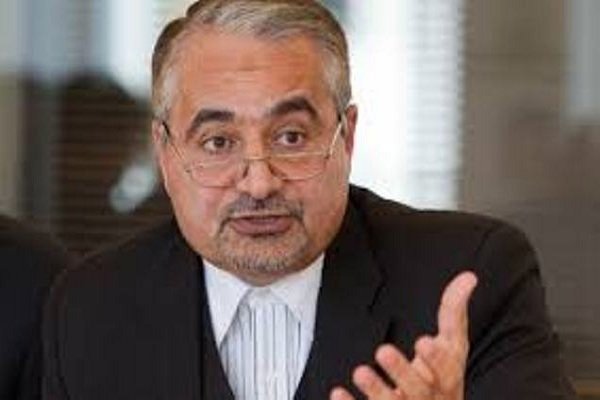Missile dialogue between Iran and the West

U.S. President Donald Trump has made it clear that his opposition to the Iran nuclear deal—known as the Joint Comprehensive Plan of Action (JCPOA)—is mainly rooted in Iran’s missile program and regional policies. Meanwhile, the European powers that seek to preserve the deal have latched onto U.S. concerns about Iran’s missile and regional policies in an apparent bid to convince Trump to maintain U.S. commitment to the JCPOA.
During the nuclear negotiations in 2011 and 2012, when Mahmoud Ahmadinejad was Iran’s president and Saeed Jalili the chief Iranian nuclear negotiator, I heard repeatedly from Western sources with knowledge of the talks that Iran was offering to put regional issues up for negotiation. However, the Western powers insisted on confining the negotiations to the nuclear issue. Today, the United States and European powers have apparently changed their view and wish to negotiate with Iran on matters beyond its nuclear program.
French Foreign Minister Jean-Yves Le Drian recently stated that he would discuss Iran’s ballistic missile program during a March 5 trip to Tehran. Before any talk of missile negotiations with Iran, it is first necessary for U.S. and European officials to think about the following realities regarding the Iranian missile program and U.S. negotiations with Iran.
In January 2016, the JCPOA was implemented by way of agreement between the United States, five other world powers, and Iran after having been endorsed by a UN Security Council resolution. Since then, the International Atomic Energy Agency (IAEA) has issued nine reports confirming Iranian full compliance with the deal. President Trump, on the other hand, has since coming to office telegraphed his desire to terminate the JCPOA regardless of the facts. With such a track record, how can the European powers expect Iran to trust America to negotiate on other issues?
For decades, the United States and other Western powers have imposed a conventional arms embargo on Iran while at the same time propping up Iranian regional rivals Israel and Saudi Arabia with hundreds of billions of dollars’ worth of the latest weapons systems. The result has been a destabilizing conventional weapons imbalance in the region. This is on top of the fact that the Iranian defense budget is far smaller than that of Saudi Arabia, Israel, or the United Arab Emirates, even though their combined population is less than Iran’s.
Furthermore, Iran’s Supreme Leader has voluntarily limited the range of Iran’s ballistic missiles to 2,000 kilometers, while Saudi Arabia’s Chinese-supplied missiles have a range of upwards of 4,000 kilometers. “Certainly true that Iran has ballistic missiles with regional reach. But so have others in that region. Saudi Arabia has Chinese-supplied ones. Israel have advanced ones with nuclear capability,” said former Swedish President Carl Bildt. The question thus arises of whether the United States and European powers believe in the merits of a conventional weapons balance in the region?
The United States, the major European powers, and their regional Arab allies all supported Iraqi dictator Saddam Hussein’s war of aggression against Iran during the 1980s and abetted his use of ballistic missiles and chemical weapons during the conflict. Today, the Trump White House is overtly pursuing a regime-change policy through ratcheting up sanctions, seeking to eliminate Iran’s regional strategic depth, and supporting unrest within the country. Saudi Arabia’s Crown Prince Mohammad bin Salman has for his part promised to take “the battle” inside Iran, and Saudi officials for years have urged the U.S. to attack Iran militarily. Are U.S. leaders prepared, in accordance with the UN charter, to respect Iran’s legitimate government and put an end to threats and regime-change policies?
Israel is the only nuclear-weapons state in the Middle East. By having agreed to the JCPOA and being one of the original signatories of the nuclear Non-Proliferation Treaty (NPT), Iran has demonstrated its commitment to zero nuclear weapons. Based on several treaties and a UN resolution on a nuclear-free zone in the region, Europe and the United States have also committed to fostering a Middle East free of nuclear weapons and weapons of mass destruction. Are the Western powers ready to take serious steps to meet their obligations in this area?
It is natural that Iran’s circumstances—and the real and serious threats it is up against—push it to view with suspicion Western aims to negotiate over its missile program. Iranian officials are united in the view that efforts to curtail its missile and deterrence capabilities are ultimately aimed at weakening the ability of Iran to defend itself and preserve its territorial integrity.
In recent meetings with Iranian officials, I have consistently heard the same refrain: that with regime change the name of the game in Washington, the Trump White House wishes to eliminate Iran’s missile capacity and defensive capabilities simultaneous with scuttling the JCPOA and re-imposing nuclear sanctions, all to prepare the grounds for a military attack on Iran. The Europeans, meanwhile, are viewed as playing the “good cop” to America’s “bad cop” in pushing for missile negotiations.
Given the realities surrounding the Iranian missile program, Europe and the United States must first address Iran’s reasonable concerns before insisting on missile negotiations. If Europe does not want to be led to war by the Tel Aviv-Riyadh-White House axis, as French President Emmanuel Macron has warned, it must put realistic diplomatic options on the table that incorporate legitimate Iranian security concerns.
In Persian there is an expression: “First one must prove brotherhood before demanding an inheritance.” The JCPOA represents the first comprehensive non-proliferation agreement that eliminates all pathways to a nuclear weapon. By first properly implementing the JCPOA, Europe and the United States have an opportunity to use the precedent the agreement has established to achieve the goal of a Middle East free from nuclear weapons and all weapons of mass destruction.
(Source: lobelog.com)
Leave a Comment